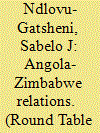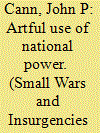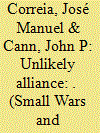| Srl | Item |
| 1 |
ID:
098126


|
|
|
| 2 |
ID:
101589


|
|
|
|
|
| Publication |
2010.
|
| Summary/Abstract |
The common approach to the study of foreign policies of Southern African Development Community (SADC) states is to locate them within the context of 'brother presidents' and 'sister liberation movements'. There is emphasis on liberation war camaraderie as a key variable. However, Angola-Zimbabwe (read as MPLA-ZANU-PF and MPLA-MDC) relations have no noticeable strong liberation war-time ties. The relations are traceable to the post-1980 period when the Zimbabwe African National Union-Patriotic Front (ZANU-PF) pursued a deliberate policy of integrating itself within the SADC region and this coincided with the Popular Movement for the Liberation of Angola's (MPLA) long-time desire to isolate its internal enemies of the National Front for the Liberation of Angola and the National Union for the Total Independence of Angola. What is also noticeable is the opacity and ambiguities in Angola-Zimbabwe relations, which have provoked growth of speculation and suspicion. The only time Angola and Zimbabwe openly collaborated was in their intervention in the Democratic Republic of Congo war in 1998 under the auspices of the SADC in general and the SADC Organ on Politics, Defence and Security in particular. However, two recent developments-the state visit to Luanda by the Prime Minister of Zimbabwe and the leader of the Movement for Democratic Change (MDC-T) Morgan Tsvangirai in October 2009, and the announcement by ZANU-PF of the China-Sonangol $8bn investment deal in November 2009-have provoked fresh interest in understanding Angola-Zimbabwe relations in the context of a regional initiative to resolve the Zimbabwe crisis. Although Angola is visible as a member of the SADC in the search for a solution to the Zimbabwe crisis, it has not openly expressed its foreign policy towards Zimbabwe. Unlike Botswana under Ian Khama and Zambia under the late Levy Mwanawasa, which openly criticised President Robert Mugabe and ZANU-PF over governance and its human rights record, Angola has remained quiet, making it hard to know its exact position vis-agrave-vis initiatives towards resolution of the Zimbabwe crisis. Interest in Angolan foreign policy is further motivated by the fact of its ascendancy as one of the regional powers; building on its rich mineral resources, it has the potential leverage to help in the resolution of the Zimbabwe crisis if it openly expressed its position. At the moment, it is not clear whether Angola has also adopted 'quiet diplomacy', just like South Africa under President Thabo Mbeki in its dealings with Zimbabwe.
|
|
|
|
|
|
|
|
|
|
|
|
|
|
|
|
| 3 |
ID:
103971


|
|
|
|
|
| Publication |
2011.
|
| Summary/Abstract |
In its colony of Angola, Portugal during its colonial wars (1961-1974) was able to exploit the economic dependence and divided population loyalties of its hostile neighbours the Congo and Zambia as well as the cleavages within the nationalist movements to prevent a crippling insurgency. The rulers of both countries were largely dependent on Angola for trade, and were eager to have the side effects of the robust Angolan economy with its 11% annual growth brush off on their own moribund ones. While relationships were never comfortable, the sponsors of revolution were forced to reign in their 'freedom fighters' in order to maintain the functioning of their export-dependent economies. Portuguese leadership also played a vital role, as it was able to bring together diverse elements of national power in a concerted policy for dealing with these enemies, whether they were insurgents or their sanctuary countries. This policy of leveraging national power and playing on the vulnerabilities of its opponents worked well during its war in Angola and still holds valuable lessons for countries that find themselves in similar circumstances.
|
|
|
|
|
|
|
|
|
|
|
|
|
|
|
|
| 4 |
ID:
152026


|
|
|
|
|
| Summary/Abstract |
The war that Portugal was obliged to fight in Africa began in 1961 and immediately stretched the resources of its armed forces. Nowhere was this thinness more apparent than in policing the vast territory of Angola. The east and southeast of Angola were particularly vulnerable, as the area was a vast, sparsely populated region characterised by enormous featureless plains or chanas covered in tall grass and broken by an extensive river system and mountainous forests. The only military solution to policing these immense spaces was aviation and specifically the helicopter that could carry troops into battle, protect them with a gunship and bring them home when the operation was concluded. The immediate problem for the Portuguese Air Force (Força Aérea Portuguesa or FAP) in Angola and elsewhere was a scarcity of helicopters. The solution was an alliance with South Africa, which had a strong inventory of Alouette IIIs, to help in policing the east. This move was likewise in the interest of South Africa, as its threat came from Zambia through south-eastern Angola. This article examines the strategic and tactical development of this unusual, cross-cultural alliance and the symbiotic relationship that resulted in destruction of the enemies of both in Angola.
|
|
|
|
|
|
|
|
|
|
|
|
|
|
|
|